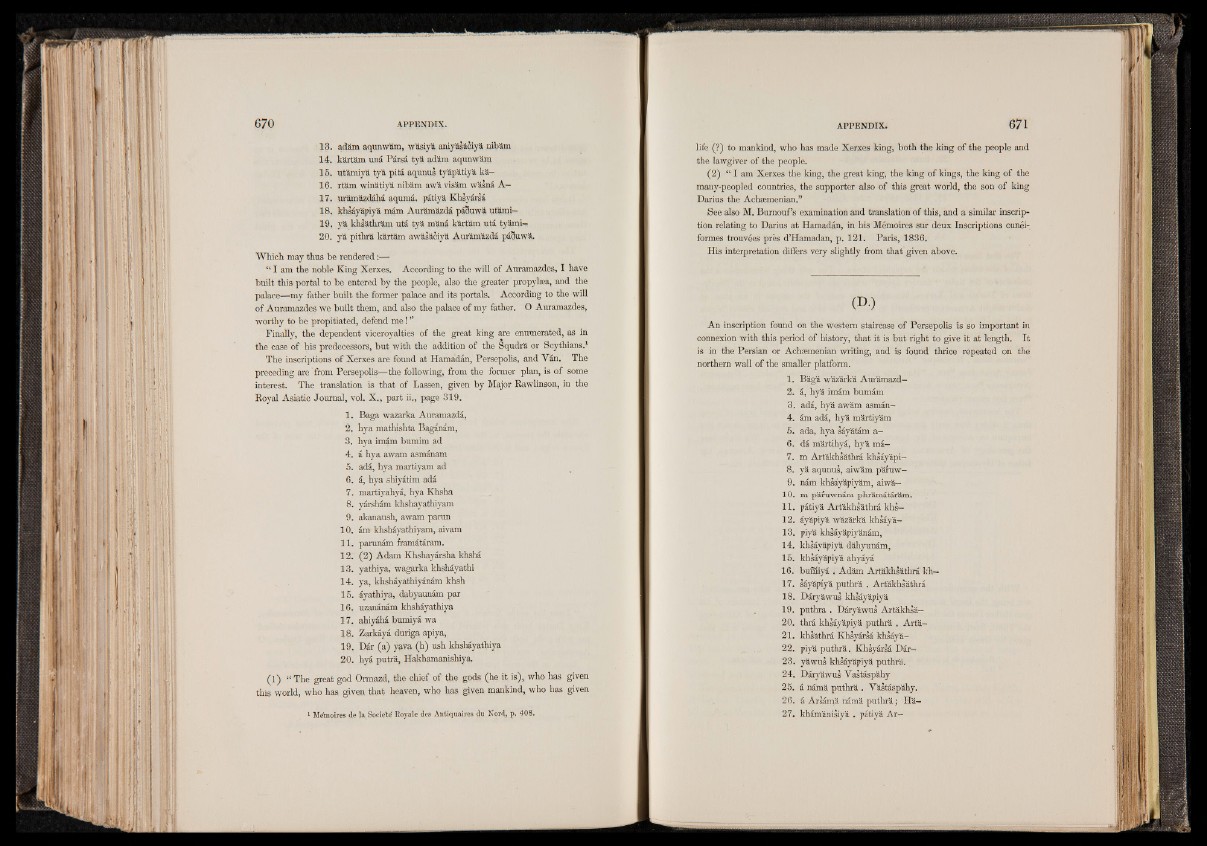
13. ad'ám aqunw’ám, w'ásiy'á aniy'ásáciyá nib'ám
14. k'árt'ám uná Pársá tyá ad'ám aqunw'ám
15. ut'ámiya ty'á pitá aqunus tyáp'átiy'á k'á—
16. rtám winátiy'á nibám awá vis'ám w'ásná A—
17. ur'ám'ázdáhá aqumá. pátiyá Khsyársá
18. khsáy'ápiy'á mam Aur'ámázdá páSuw'á ut'ámL-
19. ya khs'áthr'ám utá ty'á maná k'ártám utá tyámi-i
20. ya pithr'á kártám aw'ás'áciy'á Aurám'ázdá pábuw'á,
Which may thus be rendered:—
“ I am the noble King Xerxes. According to the will of Auramazdes, I have
built this portal to be entered by the people, also the greater propylaea, and the
palace—my father built the former palace and its portals. According to the will
of Auramazdes we built them, and also the palace of my father. O Auramazdes,
worthy to be propitiated, defend me! ”
Finally, the dependent viceroyalties of the great king are enumerated, as in
the case of his predecessors, but with the addition of the Squdr'á or Scythians.1
The inscriptions of Xerxes are found at Hamadán, Persepolis, and Ván. The
preceding are from Persepolis—the following, from the former plan, is of some
interest. The translation is that of Lassen, given by Major Rawlinson, in the
Royal Asiatic Journal, vol. X., part ii., page 319.
1. Baga wazarka Auramazdá,
2. hya mathishta Baganám,
3. hya imam bumim ad
4. á hya awam asmánam
5. adá, hya martiyam ad
6. á, hya shiyátim adá
7. martiyahyá, hya Khsha
8. yárshám khshayathiyam
9. akanaush, awam paran
10. ám khsháyathiyam, aivam
11. parunám íramátáram.
12. (2) Adam Khshayársha khshá
13. yathiya, wagarka khsháyathi
14. ya, khsháyathiyánám khsh
15. áyathiya, dabyaunám par
16. uzanánám khsháyathiya
17. ahiyáhá bumiyá wa
18. Zarkáyá dúriga apiya,
19. Dár (a) yava (h) ush khsháyathiya
20. hyá putrá, Hakhamanishiya.
(1) “ The great god Ormazd, the chief of the gods (he it is), who has given
this world, who has given that heaven, who has given mankind, who has given
1 Memoires de la Societe Royale des Antiquaires du Nord, p. 408.
life (?) to mankind, who has made Xerxes king, both the king of the people and
the lawgiver of the people.
(2) “ I am Xerxes the king, the great king, the king of kings, the king of the
many-peopled countries, the supporter also of this great world, the son of king
Darius the Achæmenian.”
See also M. Burnouf’s examination and translation of this, and a similar inscription
relating to Darius at Hamadân, in his Memoires sur deux Inscriptions cunéiformes
trouvées près d’Hamadan, p. 121. Paris, 1836.
His interpretation differs very slightly from that given above.
(D.)
An inscription found on the western staircase of Persepolis is so important in
connexion with this period of history, that it is but right to give it at length. It
is in the Persian or Achaemenian writing, and is found thrice repeated on the
northern wall of the smaller platform.
1. B'aga wazarka Auramazd—
2. a, hya imam bumam
3. ada, hya awam asman—
4. am ada, hya martiyam
5. ada, hya say'atam a—
6. da martihya, hya ma—
7. m Artakhsathra khsayapi-
8. ya aqunus, aiwam paruw-
9. nam khsayapiyam, aiwa—
10. m paruwnam phramatar'am.
11. patiya Art'akhsathra khs—
12. ayapiya wazarka khsaya—
13. piy'a khsayapiyanam,
14. khsavapiya dahyunam,
15. khsayapiya ahyaya
16. bumiya . Adam Artakhsathra kh—
17. say apiya puthra . Artakhsathra
18. Daryawus khsayapiya
19. puthra . Daryawus Artakhsa—
20. thra khsayapiya puthra . Arta-
21. khsathra Khsyarsa khsay'a-
22. piy'a puthra. Khsyarsa Dar—
23. yawus khsay'apiya puthra.
24. Daryawus Vastaspahy
25. a nam'd puthra . Vastaspahy.
26. a Arsan^a nama puthra; H a -
27. khamanisiya . patiya Ar—